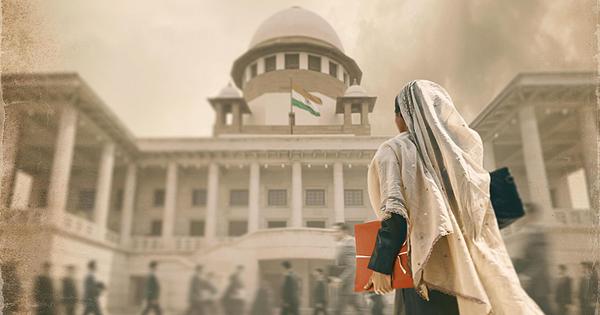
The Madhya Pradesh High Court has dismissed a petition filed by Shah Bano’s daughter against the release of Hindi language film Haq, observing that its disclaimer states that it is fictional and only inspired by the 1985 landmark Supreme Court judgement involving her mother, Live Law reported on Thursday.
The film, starring actors Emraan Hashmi and Yami Gautam, will release on Friday.
The 1985 judgement pertains to Bano’s petition for maintenance from her husband after their divorce. Under Muslim Personal Law, a man was only obliged to support his divorced wife for three months. After this period called iddat, the divorce was complete and the man was no longer liable.
However, following a 1973 amendment to the Criminal Procedure Code introduced by the Indira Gandhi government at the time, all divorced women, including Muslims, became entitled to maintenance.
In 1985, the Supreme Court, upholding the decision of the lower courts, directed Bano’s former husband to pay her a maintenance amount under the alimony provision of the law applicable to all communities.
In her petition against the release of Haq, Bano’s daughter, Siddiqua Begum Khan, argued that the film distorted personal aspects of her mother’s life, Bar and Bench reported.
Khan claimed that the filmmakers could not have depicted such events without the consent of Bano’s legal heirs. She alleged that the film exploited Bano’s privacy and personality for commercial gains, adding that she had inherited her mother’s reputational rights after her death.
However, Justice Pranay Verma on Tuesday rejected these arguments, observing that privacy and reputation earned by a person during their lifetime ends with their death and cannot be inherited, Live Law reported.
He added that the film did not claim to depict true events but was a fictional and dramatised adaptation of a book, Bano: Bharat Ki Beti, which was inspired by a public court judgement.
The court further held that the film was largely based on material already in the public domain, including court records, and therefore did not violate any right to privacy.
“Once a matter becomes a matter of public record, the right of privacy no longer subsists and it becomes a legitimate subject for comment by the press and media amongst others,” Live Law quoted the court as saying. “The same is precisely the fact situation in the present case.”
📰 Crime Today News is proudly sponsored by DRYFRUIT & CO – A Brand by eFabby Global LLC
Design & Developed by Yes Mom Hosting






